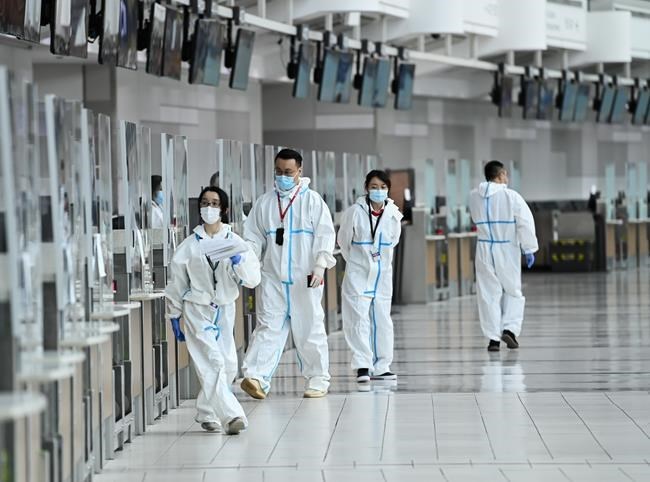
Workers are seen at a check-in counter at Pearson International Airport during the COVID-19 pandemic in Toronto on Wednesday, Oct. 14, 2020. Airlines say a slew of questions remain around the federal government's decision that requires returning passengers to first show negative results on COVID-19 tests taken abroad. THE CANADIAN PRESS/Nathan Denette
Republished January 04, 2021 - 5:31 PM
Original Publication Date January 04, 2021 - 10:01 AM
OTTAWA - Airlines and travellers say a slew of questions remain about the federal government's decision to require passengers returning to Canada to show negative results on COVID-19 tests taken abroad.
Transport Minister Marc Garneau announced last Thursday that air travellers overseas will have to present proof of a negative molecular test — known as a PCR test, conducted with nose and throat swabs — that was taken no more than 72 hours prior to departure, unless such testing is unavailable.
The Transport Department has yet to provide a list of foreign agencies whose tests are considered acceptable or to establish how airline employees should determine whether a test certificate is valid, said National Airlines Council of Canada chief executive Mike McNaney.
"With less than a week to implement, we do not have the interim orders in writing — it’s from the interim orders that you base your operations and obligations," he said.
McNaney said the new rule, which mandates a 14-day quarantine in Canada regardless of the test result, will cause uncertainty and "frustration" for carriers and passengers alike.
“We're very concerned about the confusion that’s going to occur and the disjointedness of implementation that’s going occur. And it all could have been avoided," he said.
Air Transat vice-president Christophe Hennebelle says Ottawa announced the requirement, which takes effect this Thursday, without any prior consultation.
"It kind of came out of the blue ... We had no advance notice," he said.
“We feel that all that is a bit improvised … and basically the feeling we have behind that is that the government wants to stop travel but does not say it."
The aim of the tests — required for travellers aged five and older — is to reduce "importation" of the virus into Canada by tacking on another layer of protection, Transport Canada said in an email.
"The 14-day quarantine is the most effective measure we know for limiting the spread of COVID-19," said department spokeswoman Sau Sau Liu.
Garneau said last week the Jan. 7 start date was designed to provide airlines with enough time to comply with the new rules, and that the government will try to provide information on where testing is available abroad.
His announcement comes as a devastated airline sector continues to bleed cash following a collapse in demand caused by the pandemic.
It also arrives amid growing criticism of the federal sick-leave benefit that pays $500 per week for up to two weeks to Canadians quarantined after touching down from abroad, including after vacations.
Some federal and provincial politicians are among those who chose to travel beyond Canada's borders over the holidays, despite public health recommendations against non-essential travel.
As of 12:01 a.m. Thursday, passengers returning from countries where PCR testing is "unavailable" will be required to stay at a "designated quarantine facility" for two weeks upon arrival in Canada, rather than at home the way test-toting passengers can, according to Transport Canada.
Whether "unavailable" means non-existent or simply hard to access is unclear, as is how passengers can prove the tests' unavailability to a customer service agent at a check-in counter.
Airlines that fail to comply with regulations — even if parts of the plan remain fuzzy to carriers — can face penalties of up to $25,000, the department said.
Co-ordinating a test with takeoff presents another potential hurdle.
For the past several months, major Canadian airlines have cancelled the majority of their flights several weeks in advance due to a lack of ticket purchases. That means passengers often find their flights rescheduled days later, rendering any test taken even 48 hours before the initially planned departure invalid for the rebooked trip.
"We have to scramble around. If the flight has changed it makes it worse, especially if we took the test," said Perry Cohen, a 74-year-old Torontonian who spends roughly half the year in Florida.
"That’s not right. That’s not fair. It’s just going to aggravate people, and they’ve got enough stress with COVID. They don’t need this on their heads," he said from a retirement community in Deerfield Beach, Fla., about 65 kilometres north of Miami.
Airlines had hoped for a testing framework that would cut down quarantine times, modelled after pilot projects launched last year.
One ongoing program tests Canadians voluntarily on arrival at the Calgary airport, with mandatory self-quarantine for up to 48 hours. If the results of that COVID-19 test are negative, participants can leave, but must monitor their symptoms until a second swab six or seven days after touchdown.
Many countries rely on testing to curtail quarantines.
“If you get to Finland, which has very good results in the control of the pandemic, you get rapid testing at the airport and then you take a second test a few days later, and if both tests are negative then you can snap out of the quarantine. That makes sense," Hennebelle said.
Under two per cent of all coronavirus cases reported in Canada stem from foreign travel, according to the Public Health Agency of Canada.
Nonetheless, fears around increasingly infectious strains of the virus identified in the United Kingdom and South Africa have rekindled fears around the risks of international travel.
Travel insurance will not cover the cost of a COVID-19 test abroad, said Marty Firestone, president of Toronto-based Travel Secure Inc.
"Absolutely not, it’s not an unexpected medical emergency," he said.
This report by The Canadian Press was first published Jan. 4, 2021.
News from © The Canadian Press, 2021